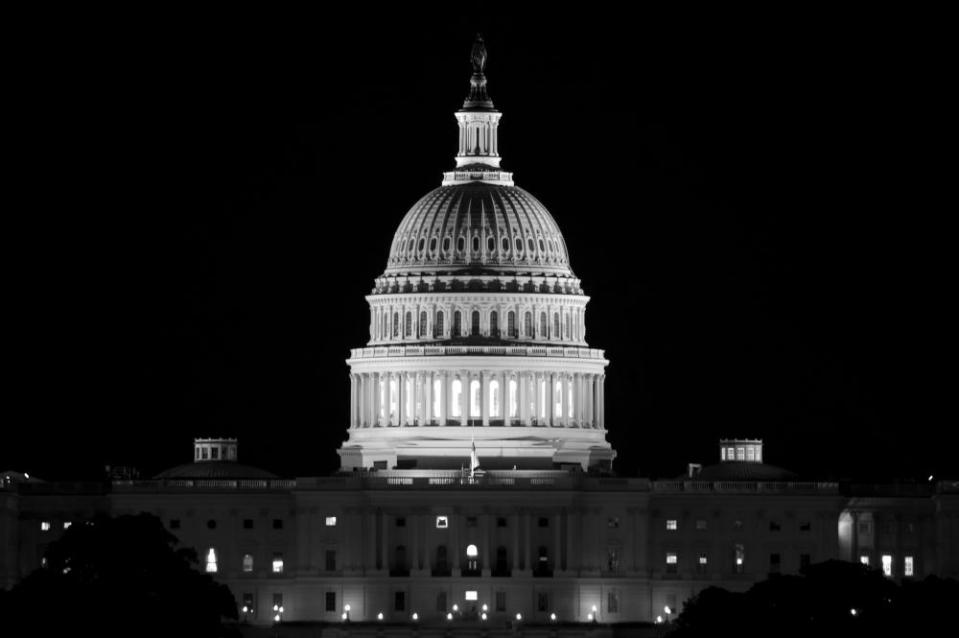Joe Biden’s reforming agenda at risk of dying a slow death in Congress

- Oops!Something went wrong.Please try again later.
- Oops!Something went wrong.Please try again later.
- Oops!Something went wrong.Please try again later.
Joe Biden’s first hundred days surpassed progressive expectations with the scope of their ambition. His second hundred days are being mugged by reality: the one that says Washington DC is a place where dreams go to die.
A once-in-a-generation investment in infrastructure and the climate crisis has hit a wall. Reforms on gun safety, immigration and police brutality are in limbo. Legislation to expand voting rights and reduce the influence of money in politics appears doomed.
Related: Biden’s push for racial justice at stake in bipartisan infrastructure talks
The stalled agenda reflects Republican obstruction, Democratic disunity and the inherent messiness of “sausage-making” on Capitol Hill. But it also shines a light on taken-for-granted structures of American government and democracy that many argue are no longer fit for purpose because they favor gridlock and militate against sweeping change.
“The American system of government is a beta form of democracy,” said Ezra Levin, a former congressional staffer who is co-executive director of the grassroots movement Indivisible. “We have a presidential system that hasn’t really substantially been updated since the 19th century.
“Nobody designing a democracy today would create as many veto points as we have and nobody, including the original founders, would have developed a system like the Senate filibuster where theoretically senators representing 11% of the population can veto legislation that is wildly popular.”
Much has been written about Biden’s prospects of emulating Franklin D Roosevelt (FDR) and Lyndon B Johnson (LBJ) with a transformational presidency and eclipse Barack Obama by throwing caution to the winds. The excitement only grew with the passage of a $1.9tn coronavirus relief package in March.
But that, it transpires, was the exception not the rule. The Democrats’ progressive wing is becoming increasingly frustrated as other promises go unrealised, fearing an all-too-familiar pattern of hopes dashed and dreams deferred that will only feed anti-Washington resentment.
Ro Khanna, a congressman from California who was a co-chair of Senator Bernie Sanders’ presidential campaign, told the Associated Press: “There’s a lot of anxiety. It’s a question really for President Biden: what kind of president does he want to be?”
Joe Biden won a fairly significant personal victory but the 2020 elections were hardly a victory for the Democratic party as a whole
Bill Galston
The first problem is that Biden does not have a Roosevelt-like majority in Congress. Democrats have only a wafer-thin advantage in the House of Representatives. The Senate is evenly divided between 50 Democrats and 50 Republicans, giving Vice-President Kamala Harris the tie-breaker vote. It is hardly a recipe for revolution.
Bill Galston, a senior fellow at the Brookings Institution thinktank in Washington, said: “There was always the brute fact that the Democrats had the slimmest margin in the House of Representatives they’ve enjoyed since the 1940s and you can’t get any closer in the Senate than a tie broken by the vice-president.
“So the fact of the matter is that Joe Biden won a fairly significant personal victory but the 2020 elections were hardly a victory for the Democratic party as a whole. Anything but. So I really had to shake my head and chuckle when I read all of those early comparisons to FDR and LBJ.”
The balance of power leaves Biden’s entire legislative agenda subject to the whims of any individual senator. He got a taste of this last weekend when Joe Manchin, a conservative Democrat from West Virginia, declared his opposition to the For the People Act, a voting rights bill that many activists regard as crucial to protecting democracy and a direct response to restrictive new voting laws being passed in Republican-led states.

In a newspaper column, Manchin described the bill as the “wrong piece of legislation to bring our country together” and a barrier to Senate bipartisanship. This was despite polls showing clear support for it in his home state. His stand provoked anger among progressives and prompted civil rights leaders to meet Manchin on Tuesday.
Mondale Robinson, founder of the Black Male Voter Project, a member of the Just Democracy coalition, said: “There is nothing partisan about this. What’s partisan is what’s happened since 2020 where you have Republican state legislatures proposing bills and enacting laws that will restrict Black and brown people all over this country from being able to participate in our democracy.
“That’s sad to me. especially because some of the Black men that we talk to voted for the first time in 2020 in ways that are no longer legal in some of the states in this country, simply because Republicans saw that if they allow people to vote by mail or use drop boxes, which are some of the most secure ways to vote, they lose elections.”
Manchin has also joined the Democratic senator Kyrsten Sinema of Arizona in publicly refusing to end the filibuster, a procedural rule that requires 60 votes to advance most legislation, meaning that at least 10 Republicans would need to cross party lines to help Democrats achieve their priorities. Some senators propose reducing the voting threshold to 51.
Activists increasingly regard blowing up the filibuster as essential and fundamental. Robinson added: “The fact that Joe Biden has been more progressive than I thought is a testament to him understanding the moment and I feel like some other elected officials aren’t reading the tea leaves. Roosevelt had a majority that Joe Biden can only dream for and we don’t have those majorities right now.
What our lawmaking process does is make it all but impossible to enact sweeping, comprehensive change
William Howell
“So what it all leads back to is a need to eliminate the filibuster. We need to continue to make it clear to Senator Manchin he has a choice to do something or do nothing, and then someone has to press upon him that history will remember those choices.”
America’s founding fathers constructed a government of checks and balances that guarded against rash action: a chief executive, a bicameral Congress with veto power, an independent judiciary. Washington mythology held that they invented the filibuster to guard against the tyranny of the majority but this has repeatedly been debunked by scholars who say it was created by mistake and first used in 1837.
William Howell, a political scientist at the Harris School of Public Policy at the University of Chicago, said: “The framers didn’t create the filibuster. It’s excessive even by their standards.
“What our lawmaking process does generally, and what the filibuster does in particular, is make it all but impossible to enact sweeping, comprehensive change. It leaves in its wake pervasive gridlock and sporadic opportunity to make incremental changes and that’s about it.”
Every major piece of legislation successfully enacted over the past decade has circumvented the filibuster through a process called budget reconciliation, Howell noted. This tool may allow Democrats to go it alone with the American Jobs Plan, which would invest heavily in bridges, railways and roads, “soft” infrastructure such as caregiving and clean energy.

Sheldon Whitehouse, a Democratic senator for Rhode Island, tweeted that he is “nervous” about Congress doing too little to address the climate crisis. “We must get Senate Dems unified on climate on a real reconciliation bill, lest we get sucked into ‘bipartisanship’ mud where we fail on climate,” he wrote.
The filibuster is hardly the only design fault. It comes on top of a Senate that is deeply unrepresentative because each state gets two seats, no matter the size of its population. That means small, predominantly white states carry as much heft as huge, racially diverse states such as California. An effort to make the District of Columbia the 51st state would begin to redress the balance but Manchin has again vowed opposition.
Levin, the Indivisible organiser, said: “The 50 Democratic senators represent 41 million more Americans than the 50 Republican senators. I think anybody objectively looking at how legislation is passed in this country has to come away with the conclusion that we are not set up to tackle 21st-century problems with a 19th-century democracy.”
I don’t think it’s fair to say that an op-ed from a single senator dictates the future of that legislation
Ezra Levin
Despite these headwinds, Levin is not giving up on Biden’s progressive project, pointing out that Democratic presidents have been here before. In 1964, under Johnson, the Civil Rights Act passed the Senate after overcoming a 54-day filibuster, and the following year the Voting Rights Act took more than a month of full Senate debate to escape the threat.
“Neither of those things were passed with the snap of a finger,” he said. “It is fair to say the For the People Act is a tough fight. I don’t think it’s fair to say that an op-ed from a single senator dictates the future of that legislation. It’s always easy to be cynical about these things but there’s reason to hope. There are very real pathways forward to get this done.”
Groups supporting the legislation intend to press ahead with a $30m campaign pressing Democratic senators to rewrite filibuster rules and pass the bill. Manchin has talked about supporting another voting bill, the John Lewis Voting Rights Act, but activists insist that both pieces of legislation are needed.
LaTosha Brown, co-founder of Black Voters Matter, said: “What we are seeing is that, as America becomes younger and more diverse, the reality is we currently do not have a political infrastructure that can support the kind of democracy that is laid out in the constitution where people have free and fair access to the ballot.
“We need the For the People Act and the John Lewis Voting Rights Act as a step closer to strengthening our democracy and protecting those elements that have literally been fought and won through protest, through giving of lives.”

